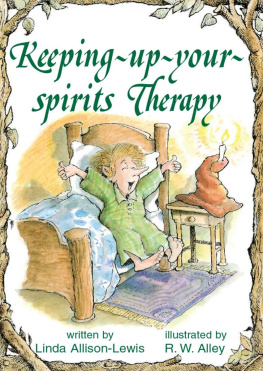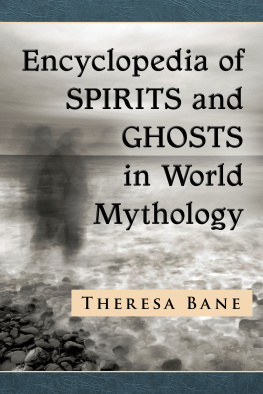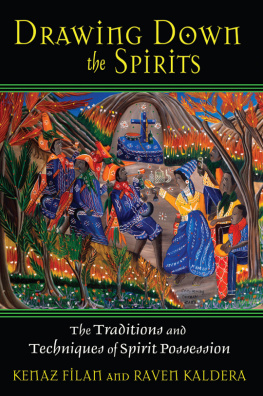
TALKING TO THE SPIRITS

Filan and Kaldera have once again created an impressive and necessary work for the flourishing spirit-working Pagan community. In these pages you will find an immediate, earthy, social, and accessible way to approach this dangerous and risky alliance with the Spirits. This book touches on personal gnosis, historical gnosis, Neo-Pagan perspectives and sociologies, and discernment of messages in alluringly deepening ways. It also shares responsible and proactive ways of working with gnosis and revelation in groups and community to achieve whole and integrated spirituality with an ear to the ever interesting, ever bizarre Otherworld peopled with Endless Spirits. As a spirit-worker, I personally attest that this book is a must read!
GEDE PARMA, WITCHCRAFT PRIEST AND TEACHER AND AUTHOR OF ECSTATIC WITCHCRAFT AND SPIRITED
In recent years there has been a greater desire for deeper connection with the Gods within a polytheistic pagan framework. Talking to the Spirits is a practical manual for such work, particularly for those relying on their own impressionspersonal gnosisto fill in the gaps left by mythology, history, and established religions. In the same way, this book fills a gaping niche in the practitioners shelf. It is clear the authors have dealt with a variety of challenges in deeper spirit work as well as found suitable solutions, and the subject matter is covered in an impressively thorough manner.
LUPA, AUTHOR OF NEW PATHS TO ANIMAL TOTEMS AND EDITOR OF THEGREENWOLF.COM
INTRODUCTION

Reclaiming Our Gods, Reconstructing Our Faith
Of all the lies we have ever been told, this is the worst: that the Gods no longer speak to us. If they ever conversed with mere mortals, we are told, they have long since gone silent. And in any event, everything they had to say to us can be found in their holy book (although, alas, theres some dispute on exactly which book that is). For our ancestors, Divinity was immanent, bubbling forth from rivers and springs, and whispering in the breezes that rustled through the cities and the farms. Our spiritual world is much more circumscribed: an inaccessible sacred casts a faint, chilly glow upon our profane lives.
Stranded in that cold and lonely darkness, some seek to reestablish our ancestral relationships with the Divine. To that end, many have declared their allegiance to the Old Gods. But as these pioneers have sought to progress in their faith, they have often found themselves stymied by centuries of conditioning. To find our way back to that ancestral place where we walked with the Gods, we must relearn how to see the world as they did.
HEATHEN (n): A benighted creature who has the folly to worship something he can see and feel.
Ambrose Bierce
When you go back far enough, everyone, regardless of culture or geography, lived in a world that was more alive than ours. The ground underfoot, the stones, the fire that cooked the food and drove off the darkness, these all had spiritsnot just spirits in some other dimension who were in charge of them, but spirits in them, who could be spoken to and allied with. At the same time, larger powers existed who were in charge of their children and watched over them... and could add us to that flock, if we were willing. Gods werent something far removed from the physical world of flesh and soil and desires; the hundred Gods were only one step farther away than the thousand spirits. Between those groups was no firm line but only a gray area that often shifted depending on how much attention they were paying you at the moment.
Before we can make the leap to understanding the hundred Gods, we must first understand the thousand spirits and develop a soul-deep feel for how spiritually alive our entire world really is. Once we have connected with the river spirit and the local city spirit and a few of our ancestors, and we understand how their existence is woven into everyday lifenot a superstition but an easily accepted factwe can then begin to understand how the Gods, too, are part of that everyday life.
For as long as there have been empires there have been Gods of empire. Conquered nations were expected to make obeisance to the conquerors Deities, and the tributes of subject peoples enriched many a holy temple. These offerings and rituals were more akin to the American Pledge of Allegiance or Soviet military parades than to the Christian idea of worship. In honoring the empires Gods you proclaimed your loyaltyor at least recognized their military superiority. In building a great monument to your patron Gods you acknowledged their blessings, but also displayed your citys wealth.
But while people went to these public temples for public functions, for most, their primary spiritual focus was on the Gods of hearth and home. Local and ancestral spirits were more directly connected to the lives of their devotees and more ready to intervene in their daily affairs. Artisans, criminals, and farmers might have a special devotion to the patrons of their trades: fishers and sailors might propitiate both Poseidon and the nymphs who ruled over a particularly treacherous inlet.
These spiritual arenasthe public and privatecoexisted in relative comfort. You might fulfill civic duties at a local temple, drop a coin in the stream for a local spirit on your way home, then spend some quiet time with your ancestors before your hearth. So long as you posed no threat to the established order, you were free to believe as you chose. It was only with the establishment of Christendomfirst as an effort to preserve the crumbling Roman Empire, then as a defensive coalition against the new threat of Islamthat the religious authorities set out to control private spiritual practice.
Laws against malevolent magic are not unique to Christianity or to monotheism. What is unique to these traditions is how they define all other spiritual practices as inherently evil or, at best, terminally flawed. The mystical experience is either carefully delimited or rejected outright as demonolatry (demon worship) and sorcery. The idea of local wights is treated as silly; sentience, like souls, is a human phenomenon; and one should worship the Creator, not the Creation. Its easy to assume that all religions see their Gods as equally distant and detachedbut that is not the case at all. Consider Japan, where Shinto spirits can be found in the heavens, on the sea, and in your familys outhouse! Dr. Gabi Greve, an art historian living in Okayama, Japan, writes about her experience with a toilet God.
When we remodeled our old farmhouse, we had to do something about grandfathers toilet. It was just a small pond in the ground, with two beams over it where you had to balance real hard while performing your job. Below you was the open sewer.
The local carpenter decided to drain the sewage water, fill the hole up with earth and level it with the rest of the ground. But before doing anything to this smelling place, we were informed, we had to pacify the Suijinsama [water God] living in this pond.
With plenty of ricewine (for the God and the humans) and purifying salt and a lot of mumbling prayers, the God was informed that his palace was to go and he would be relocated in a wet rice field further down. After the water was drained, a pipe was stuck in the hole before it was filled up, so that the Suijinsama who might have been left in the place would find their way out. This pipe is still sticking out to this day.
Next page












